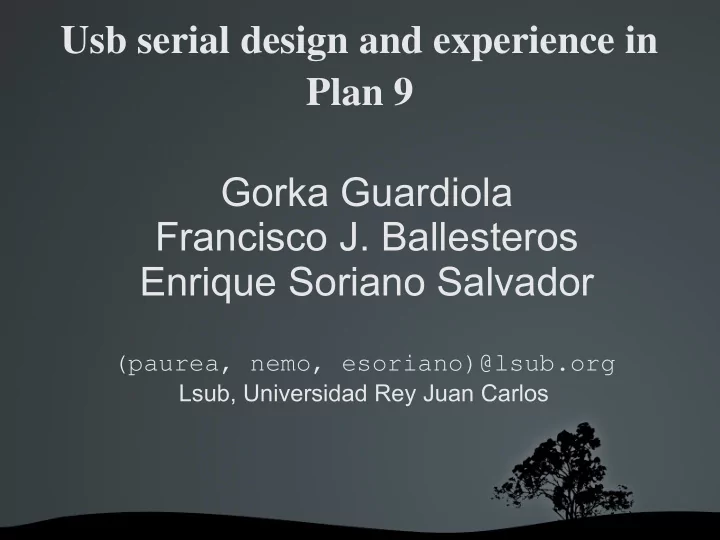

Usb serial design and experience in Plan 9 Gorka Guardiola Francisco J. Ballesteros Enrique Soriano Salvador (paurea, nemo, esoriano)@lsub.org Lsub, Universidad Rey Juan Carlos
No serial on new computers Most computers don't come with serial Specially laptops, many times servers
No problem ¿right? Who needs serial anyways? Use the network or cec or... But...
Need for serial Porting an O.S. is already hard enough From reboot/loop + led to interrupts and mmu working Couple of registers at most No needs for interrupts (polling mode) Normally comes preinitialized
Alternatives Usb debug plug: tried it only some Ehci leaves you without usb port looses bytes (maybe a fixed bug?) Cec: need interrupts + ethernet driver +... at that point I am done porting Not real alternative as it is, which is why...
What vendors do Have secret serial ports (may need soldering) Include Serial to USB chip inside
Kinds of usb/serial Usb debug cable Prolific, Ftdi, inside the sheeva Cdc-acm, inside phones
Usb debug cable Driver in the kernel for the debugged machine Driver in usb/serial for console/debugger Only works for EHCI, cannot use the port Mostly working, looses bytes (probably a solved bug) Careful while using, (asymmetric, one side powered)
Prolific First one we supported (pl2303) Inside most cheap usb/serial cables and some old dock stations Driver inside usb/serial Seems to work, tried with two cables Ported the gumstix with it No extra modem flow control supported, just basics
Ftdi Inside the sheeva and most new usb devices Many serial devices had an ftdi added Driver in usb/serial Works well except for some unresolved issue (Geoff?) Multiport supported, but untried (I don't have any device, Jeff?)
Cdc-acm Usb standard for serial communications I had not seen any until recently Inside phones and 3G/umts modems It was unsupported at the time of writing now Now Peter Bosch and Jan Sacha seem to have one working in usb/serial (I am guessing)
Architecture main.c standard USB not embedded main serial.[ch] common infrastructure, detection, filesystem ftdi.[ch] for FTDI support prolific.[ch] Prolific support ucons.[ch] EHCI debug cable
Architecture Detection Configuration Serial ops Read/write Wait4data/wait4write
struct Serialops { int (*seteps)(Serialport*); int (*init)(Serialport*); int (*getparam)(Serialport*); int (*setparam)(Serialport*); int (*clearpipes)(Serialport*); int (*reset)(Serial*); int (*sendlines)(Serialport*); int (*modemctl)(Serialport*, int); int (*setbreak)(Serialport*, int); int (*readstatus)(Serialport*); int (*wait4data)(Serialport*, uchar *, int); int (*wait4write)(Serialport*, uchar *, int); }
Procs/concurrency Operations in the fs proc (one per operation in USB) Qlock per device (not per port) Each device may create extra procs for reading interrupt In FTDI, data+metadata are mixed and periodic, and we need to read as much as we can RPC over channels for reading (take away headers, read lines)
Cleaning up There can be errors on different procs, sender/receivers Need to try recovering from port to device Need to take care of in-transit data Added chanclose and chanclosing to thread library Similar to Go (but not quite)
Close Chanclose closes a channel, unblocks all operations After chanclose it is all non-blocking When all the channels on an Alt are closed, error Chanclosing returns: -1 if close was not called Number of items on the channel otherwise Complex to get right: Interrupts Alt
Close Common pattern of use is Sender closes, does not touch the channel Receiver gets the error, check chanclosing if 0 frees More than one sender/receiver, use reference counting
Naming Added a U (eiaU0) Needed a root, because the USB fs library eiaU0/eiaU0.3ctl eiaU0/eiaU0.3 Sort of redundant but need a unique name in /dev Fused ctl and status Mount in /n if run by hand, /dev if embedded Do not want to leave /dev broken
Performance problems Serial devices are faster than we thought (specially FTDI) Reading smaller packets does not cut it (too many context switches) We were loosing bytes Read a big chunk and then break in packets
Docs/specs Specs if any (if overwhelming, leave for last) http://www.usb.org/developers/devclass_docs/usbcdc11.pdf Vendors (various results) FreeBSD, cleaner, know better what they are doing http://fxr.watson.org/fxr/source/dev/usb/serial/umodem.c Linux, hardware bugs, more complete http://tomoyo.sourceforge.jp/cgi-bin/lxr/source/drivers/usb/class/cdc-acm.c Sniffing Linux using wireshark Any embedded library you can find
Conclusions Simple, clean usb-serial implementation Line disciple not mixed with driver and hand USB transactions (USB infrastructure + Plan 9 approach) Easy to debug and add new drivers
Future work More testing Multiport is untested (we don't have devices) Not all features have been throughly tested Cdc-acm soon: Jan Sacha has got it working JTAG
Recommend
More recommend